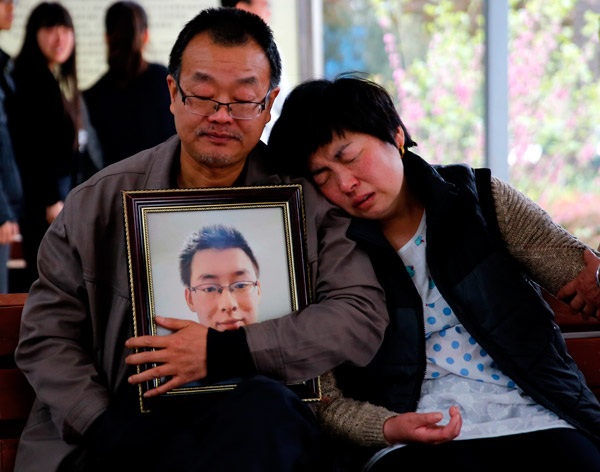Tighter regulation can remedy healthcare ills
Updated: 2016-05-04 07:39
(China Daily)
|
|||||||||
 |
|
The parents of Wei Zexi, a computer science major at Xidian University in Shaanxi province who died of a rare form of cancer, wait outside a funeral home in Xianyang, Shaanxi, on April 13. WAN JIA / FOR CHINA DAILY |
The wrath directed at China's online search giant Baidu is understandable.
The company, which holds a monopoly over access to online information in China, has been accused of showing little sense of its corporate social responsibility and of risking people's lives with a paid search listing model that promotes medical treatments in its search results in exchange for money.
The latest victim of this business model was a college undergraduate, Wei Zexi, who suffered from a rare tissue cancer and in desperation searched for a treatment on Baidu.
High on the first page of the search results he found a Beijing hospital that seemed to offer an effective cure. However, in less than a year, he had lost both his money and his life.
While the public's anger at this dubious business practice has been sparked by the young man's death, Baidu should not be the only target.
The immunotherapy treatment Wei received at the hospital in Beijing proved to be both ineffective and expensive. Wei's family paid more than 200,000 yuan ($31,000) for four rounds of treatment.
The biological treatment center at the Second Hospital of the Beijing Armed Police Corps, which is funded by private money, is not alone in promoting itself in this way. And while providing patients with an alternative to the resources-pressured public hospitals, private medical facilities are known for extracting as much money from patients as they can.
It is no secret that profit-driven private capital is taking up an increasing share of China's medical market, and that privately funded medical centers are often linked to or get subcontracts from reputable public or military hospitals, oftentimes secured through corruption, and thus are able to hoodwink patients into paying for unnecessary or excessive treatment.
That is where the regulators must play their intended role. Strict supervision is needed to ensure they grow in a healthy way, so profits are not placed before the well-being of patients.
If the authorities played their due role and related departments functioned as they should, medical centers would not be able to use advertisements with exaggerated claims that appear in search results to solicit patients.
Official investigations are being conducted into Baidu and the hospital after the tragedy. But to make people believe it is not a one-off remedial or a public relations tactic to appease their anger, efforts should also be made to overhaul the whole private medical care market that is plagued by dubious practices and even fraud.
Related Stories
Breaking Baidu's monopoly would help curb selling of search rankings 2016-05-03 08:13
Baidu in spotlight over ad scandal 2016-05-04 07:07
Baidu promises to support family 2016-05-03 08:12
Baidu faces probe after outcry over cancer treatment 2016-05-03 08:12
Today's Top News
Buffett optimistic on China's economic transition
Hawking answers old Chinese philosophical question
Running the world
Getting back to basics
Alibaba denies reported takeover of AC Milan
China stresses Putin's expected visit
Russia launches rocket from Vostochny Cosmodrome
Record number of Chinese exhibitors at Spanish expo
Hot Topics
Lunar probe , China growth forecasts, Emission rules get tougher, China seen through 'colored lens', International board,
Editor's Picks

|

|

|

|

|

|







